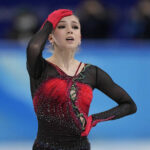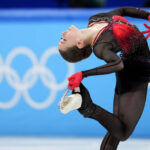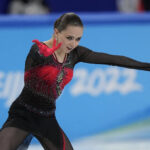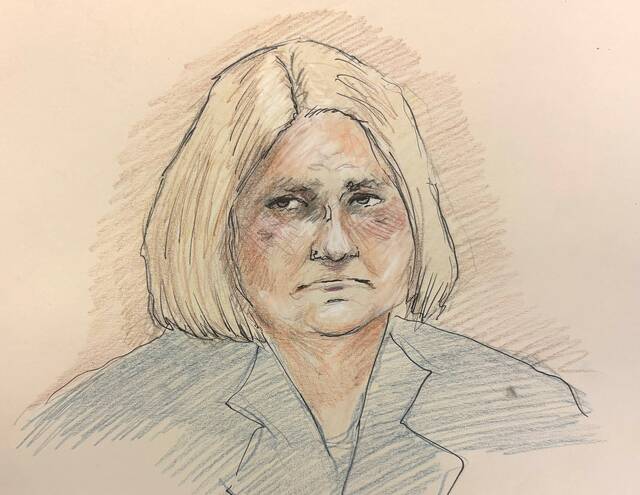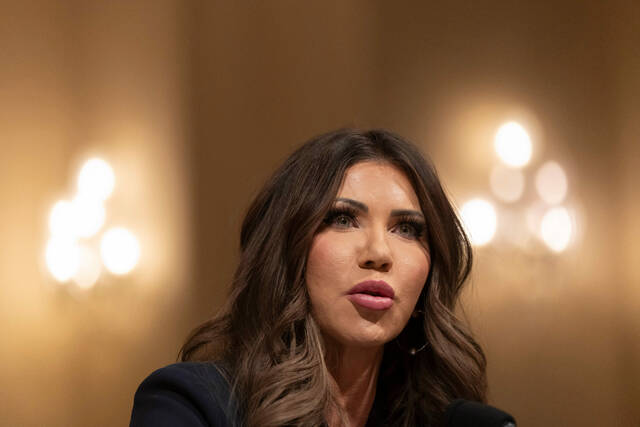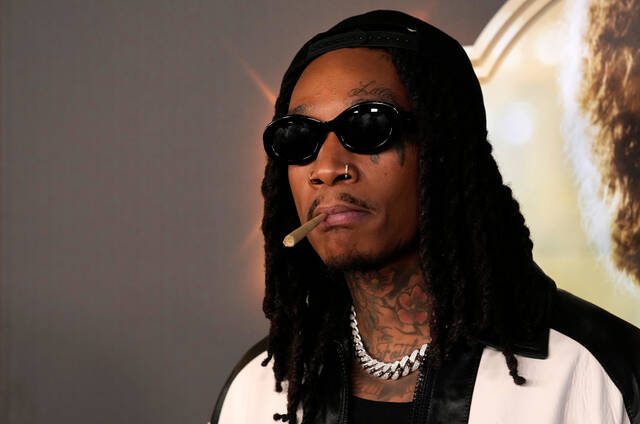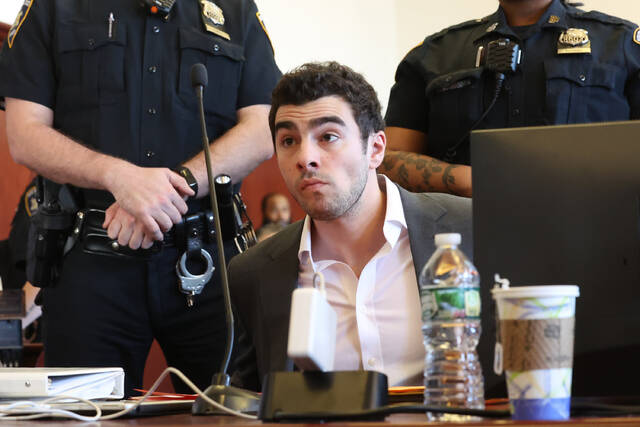GENEVA —
International Olympic officials have told counterparts in the United States that their figure skating team will receive gold medals now that Russian skater Kamila Valieva has been disqualified for doping at the 2022 Winter Games in Beijing.
The U.S. Olympic and Paralympic Committee received word Monday night that the IOC would award the gold to the U.S. for the team competition, which was thrown into turmoil after Valieva’s positive test from six weeks earlier was revealed.
The Associated Press obtained a copy of an email sent from the IOC to the USOPC saying it “is now in position to award the medals in accordance with the ranking, which has to be established by the International Skating Union” — the federation in charge of running the event at the Olympics.
The USOPC confirmed that CEO Sarah Hirshland had received the news that the Americans were declared the winners.
The IOC said it had “great sympathy with the athletes who have had to wait for two years go get the final results of their competition. The IOC will contact the respective (national Olympic committees) in order to organize a dignified Olympic medal ceremony.”
Still uncertain was how Valieva’s disqualification would affect the silver and bronze medals. Japan finished third and is likely to move to second. Depending on how a scoring rule is interpreted, Russia could still finish third — ahead of Canada — even after deducting Valieva’s points from the two events she skated in during the team event.
The Americans to receive the gold medals are Evan Bates, Karen Chen, Nathan Chen, Madison Chock, Zachary Donohue, Brandon Frazier, Madison Hubbell, Alexa Knierim and Vincent Zhou.
The case provoked legal chaos at the Beijing Olympics because Valieva’s sample, taken six weeks earlier at the Russian national championships, was not notified as a positive test until Feb. 7, 2022, by a laboratory in Sweden which had staffing issues during the covid-19 pandemic.
CAS said it upheld appeals led by the World Anti-Doping Agency, which asked the court to disqualify Valieva from the Olympics and ban her. A Russian sports tribunal had cleared her of any blame, citing that she was a minor.
The CAS judges banned her for four years, until December 25, 2025 — about seven weeks before the next Winter Olympics in Milan and Cortina d’Ampezzo, Italy.
The U.S. team took silver in Beijing and should be upgraded to gold. Japan took bronze and Canada placed fourth. The IOC is responsible for reallocating medals and its executive board is next scheduled to meet in March.
“We now anticipate the day when we can wholeheartedly celebrate these athletes, along with their peers from around the world,” the U.S. Olympic body’s CEO, Sarah Hirshland, said in a statement Monday.
The likely new Olympic champions are Evan Bates, Karen Chen, Nathan Chen, Madison Chock, Zachary Donohue, Brandon Frazier, Madison Hubbell, Alexa Knierim and Vincent Zhou.
Valieva’s legal team said it is reviewing the CAS decision before deciding whether to appeal to the Swiss supreme court, lawyer Andrea Pinna said in a statement. Pinna, who is based in Paris, led the skater’s defense at the appeal hearings in September and November.
Appeals to the Swiss supreme court can be made on narrow procedural grounds, not the merits of the case.
Valieva’s lawyers had argued she was contaminated by traces of the trimetazidine medication they said her grandfather used. She also was taking two oxygen-boosting substances that are not banned in sports.
“Having carefully considered all the evidence put before it,” the court said in a statement, “the CAS panel concluded that Ms. Valieva was not able to establish, on the balance of probabilities and on the basis of the evidence before the panel, that she had not committed the (doping violation) intentionally.”
The judges decided that, according to Russian anti-doping rules, Valieva could not benefit from having been a minor at the time of the positive test.
There was “no basis under the rules to treat them any differently from an adult athlete,” said the court, which did not publish its detailed verdict pending a review of confidentiality issues.
Valieva was able to continue to skate at the Olympics after rulings by a Russian tribunal and a separate CAS panel in Beijing did not hold her responsible because she was a minor.
The intense scrutiny on Valieva led to an error-filled skate in the individual event, where she had been favored for gold but dropped to fourth place.
The drama continued when she left the ice. The reaction of her coach, Eteri Tutberidze, was fiercely criticized by skating experts and International Olympic Committee president Thomas Bach.
Bach said in Beijing one day later he had been “very, very disturbed” to watch the “tremendous coldness” of Valieva’s entourage.
At that news conference, Bach gave an untypically direct reply apportioning blame when a Russian journalist seemed to suggest Olympic authorities and global media were bullying a 15-year-old.
“The ones who have administered this drug in her body, these are the ones who are guilty,” the IOC president said in Beijing.
World anti-doping rules require investigations of an entourage when an athlete 16 or younger tests positive. Both the Russian anti-doping body and WADA were expected to look into the case but neither has published any findings and there is no indication anyone else is facing anti-doping charges in the case.
“The doping of children is unforgivable,” the Montreal-based WADA said Monday. “Doctors, coaches or other support personnel who are found to have provided performance-enhancing substances to minors should face the full force of the World Anti-Doping Code.”
The appeal case came to CAS to challenge a Russian anti-doping tribunal verdict in late 2022 that Valieva was not at fault. That ruling suggested disqualifying her only from the national championships and letting her keep her Olympic results and gold medal.
WADA asked CAS to impose a four-year ban and to disqualify Valieva from the Olympics. The International Skating Union requested a two-year ban and disqualification.
“WADA took this appeal to CAS in the interests of fairness for athletes and clean sport and we believe that has been delivered through this decision,” the agency said.
Valieva, who turns 18 in April, has not competed internationally since the Beijing Olympics.
Four days after the closing ceremony, Russia launched its full-scale invasion of Ukraine, and five days after that, the International Skating Union banned Russian skaters from its events. That ban is still in place.
Since the Olympics, Valieva has skated on an expanded Russian national competition circuit and in various TV events and ice shows. She is no longer the near-unbeatable skater she appeared to be before the Beijing Olympics and has twice been beaten at the Russian nationals by younger skaters from the same training group under Tutberidze.
Although scores at nationals are often inflated, Valieva’s 237.99 points — third at the Russia championships — would have been the best in the world by more than 10 points this season.
American ice dancer Evan Bates said this past weekend at the national championships getting a team medal with partner partner Madison Chock will be particularly meaningful to them.
“I say, you know, we’re the only two athletes from the Beijing team that are still competing — every single one of the rest of us has moved on,” Bates said. “I think two years is too long that it’s taken for this decision to be made. We





